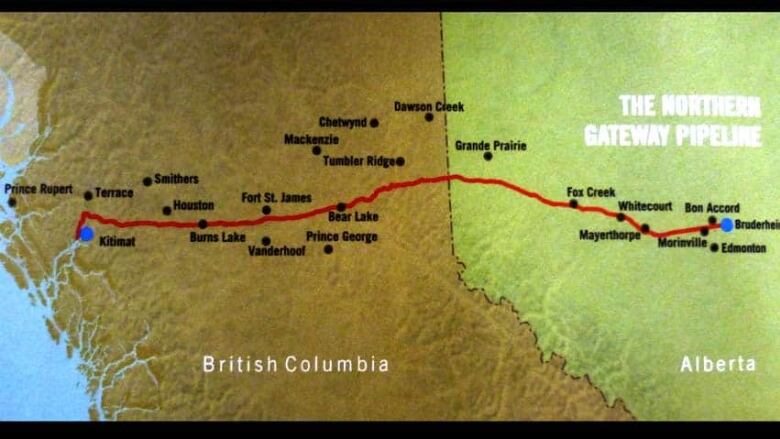B.C. First Nations dispute Enbridge pipeline claims

A group representing several B.C. First Nations says Enbridge is wrong to claim 60 per centof aboriginal communities along the proposed route of the Northern Gateway pipeline have signed on to the project.
Coastal First Nations executive director Art Sterritt says he has checked with every aboriginal group along the route from Alberta to Kitimat and only found two that have signed equity agreements with Enbridge.
Sterritt also accuses Enbridge of padding its First Nations support by widening its pipeline corridor to include aboriginal groups that would not be impacted by a spill andby including groups that don't have rights and title to land near the pipeline route.
"Enbridge expanded its pipeline corridor by 80 kilometres to increase its numbers. Many of these communities that have signed on are located outside of the areas that will be most impacted by a spill."
"We are absolutely mystified about the inclusion of the Mtis in Enbridge's 60 per cent. It's ridiculous to include groups that don't have Aboriginal Rights and Title to land within the pipeline corridor," he said.
"They have strongly rejected the agreement.We still intend to stop this project," Sterritt said in a statement released on Wednesday morning.
No firm jobs
Wilf Adam of the Lake Babine First Nation in Burns Lake, B.C., said he refused to sign the equity agreement because Enbridge was unwilling to release more details in the contract.
"I'd been asking for the financial figures and I'd been asking about the employment. They said there would be a lot of employment."
Adam said it appeared to him that there would be few jobs available for his people.
"You're not going to get a lot of jobs out of one pump house, which they said they were willing to put on our land. It would probably create fewer than five jobs."
Adam said there was a flurry of emails and phone calls from Enbridge officials after the company moved the deadline for signing the equity agreement up to May 31.
"They tried their best to sign us up, but I will not sign that agreement."
Adam said he couldn't see how it was going to be good for his people, but he figured that possibly four out of the six bands in his areas signed the equity-sharing agreement.
Enbridge claims 60 per cent support deal
Enbridge announced Tuesdaythat almost 60 per cent of First Nations along the planned Enbridge Northern Gateway pipeline between Alberta and B.C. have signed on to become part owners.
The announcement by the company comes amid a phalanx of opposition by some First Nations and environmental groups during public hearings.
But the agreements prove there is greater support for the almost 1,200-kilometre pipeline, said Enbridge spokesman Paul Stanway.
"It's a good place for us to start in demonstrating that there is aboriginal support for Northern Gateway," Stanway said. "It's not 100 per cent, but neither is it the wall of opposition that our opponents sometimes claim."
The 10 per cent equity ownership for the First Nations who signed the deal will give them about $280 million over 30 years. They would see cash flow starting in the first year of the pipeline's operation.
The names of the aboriginal partners won't be released because of contractual agreements, but Stanway said the support is split about evenly between Alberta and B.C. First Nations.
There are 45 First Nations along the pipeline, but Stanway wouldn't give a final figure on how many signed on.
He said the pipeline discussion may appear polarized from the outside, but the majority of people are in the middle on the issue.
"Some of those are willing to partner with us. That's not to say they still don't have some concerns. They want to make sure that we build and operate the pipeline as safety as possible."
Stanway said one of the advantages for First Nations who have signed the equity-sharing agreement is that they'll have more clout when it comes to decisions that are made in operating Northern Gateway.
Public hearings continue
The proposed $5.5-billion pipeline would run from Bruderheim, Alta. to Kitimat B.C., moving about 525,000 barrels of oil per day to Kitimat for export.
The public hearings have been marred by protests by First Nations and others groups. In April, hearings in Bella Bella, B.C., were put on hold amid safety concerns raised by the panel members from the federally-appointed review board.
The public hearing process is nearly at the midway point, and in September formal hearings will begin where expert witnesses will testify under oath to the review panel.
Stanway said the public hearing process has been frustrating for the company because Enbridge has only been an observer.
He said they often have the answers to many questions people are asking, but have been unable to answer them in the public process.
"But we do get to present our case in detail in the fall."












_(720p).jpg)


 OFFICIAL HD MUSIC VIDEO.jpg)
.jpg)



























































































